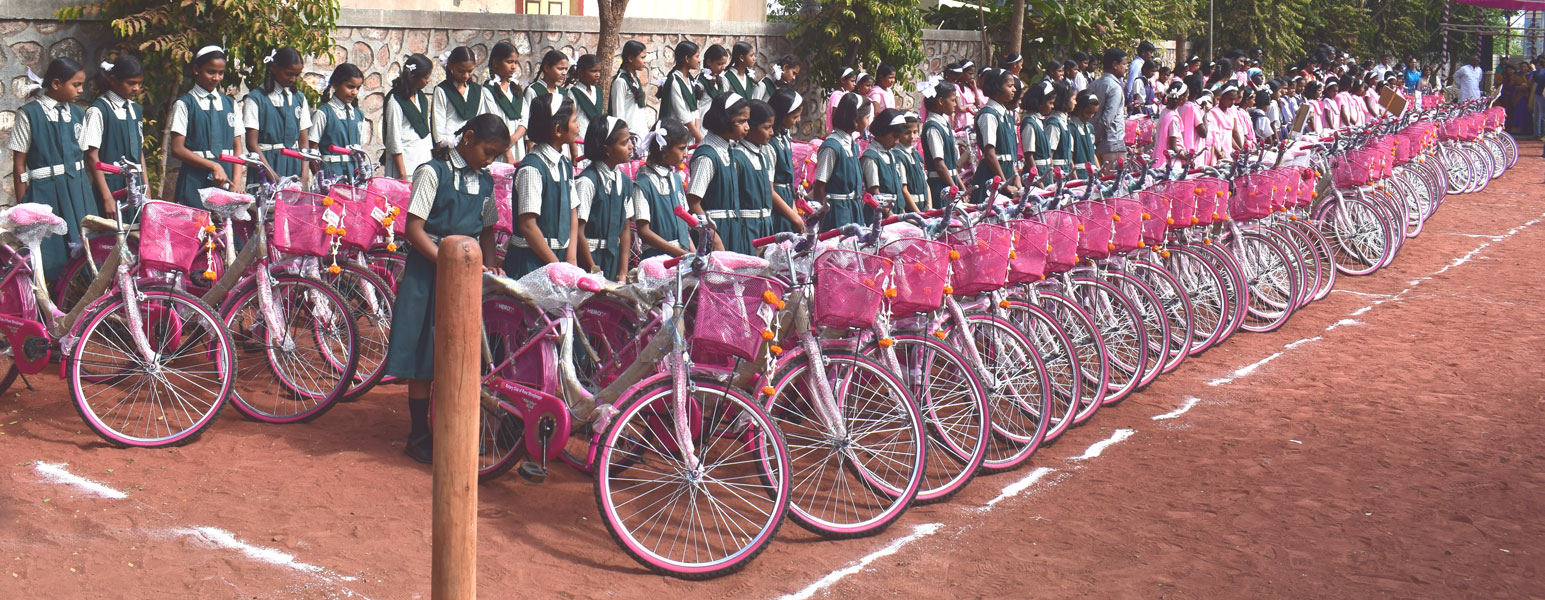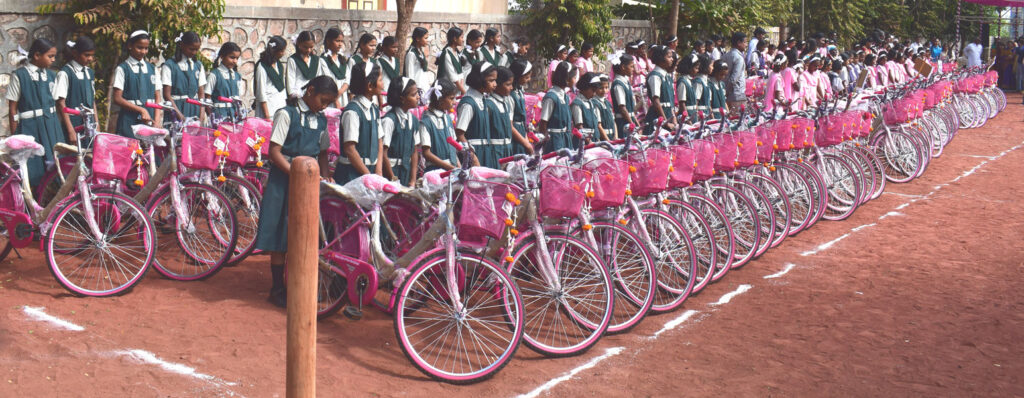On December 19, the Zilla Parishad (ZP) school in Galandwadi, about 20 km from Pune, resembled a carnival spot. From this and other neighbouring ZP schools, 108 girls, dressed neatly and colourfully in their olive green and pink uniforms — skirts-blouses and salwar suits — had assembled. Along with their teachers and parents they had all come, armed with excitement and expectation.

It was with discernible emotion and happiness the girls received a very visible symbol of their empowerment —a gleaming new bright pink cycle. A vehicle they could call their own, and one on which they could travel to their schools without any fuss or hardship. “The joy of getting a mode of transport, confidence, gratitude… so many emotions could be seen on the faces of these girls who got the bicycles,” says Vrinda Walimbe, President of the Rotary Club of Pune Shivajinagar, which has undertaken this project.
Girls find it difficult to walk over 5 km to reach their schools; it is cumbersome and risky to walk for hours through deserted fields in the early hours, after dusk and the rainy season.
It all began with a past president of the club Nitin Abhyankar wanting to do something for the region his ancestors hailed from. So the club started doing welfare activities in this area right from 2010. The bicycle project was started two years ago with just nine bicycles and “now we have crossed the 500 mark,” beams Vrinda.
Improved attendance
She says since the programme has started, the teachers at the school have seen a significant improvement in the attendance of girls. A conscious decision was taken to keep the colour of the bicycle bright pink “so that others in the community and the girls’ families would be deterred from using or stealing these bikes. The communities are aware that the bikes are only to be used for school purposes by the girls, and not on the farm or around the village for chores.”
The club wanted to focus on the empowerment of the girl child in rural areas, “as we know that in rural areas in India, particularly Maharashtra, there is little or no public transport. Students sometimes have to travel on foot for more than five km to reach school.” This makes it that much more difficult for girl students to attend school regularly. “It is cumbersome and risky to walk for hours through deserted fields to school in the early hours as well as after dusk, and in the rainy season and winters it is even more difficult,” she adds.
They found that sometimes only two girls from a locality go to school and if one of them can’t attend school for some reason, the other is forced to sit at home too, as it is unsafe for a young girl to walk a long distance all by herself. “During the difficult days of the month, it becomes physically tiresome and on some other days there is a safety hazard. All this was contributing to girls dropping out of schools in rural areas.”
Crowd funding to the rescue
So it was decided to start the bicycle project, and this got a shot in the arm when Vandana Naik, a member of the Rotary Club of Norman, USA, wellknown to one of the club members and “with whom we have been doing some global grant projects in the last few years”, came to know about the project. When she was visiting Pune six months ago, for another global grant project on waste management training, “we took her to this school, and she was very impressed,” says Vrinda.
She works with the NGO Unforgotten Funds, and promised to raise money to buy more cycles through crowd funding. A campaign was started on their website and enough money was raised to donate 100 bicycles. The club raised some more money and a total of 108 gleaming new pink bicycles were presented to the girls from many ZP schools in the region. Right at the outset the club members decided not to give used cycles to the girls as new cycles would give them a better sense of ownership.
The joy of getting a mode of transport, confidence, gratitude… so many emotions could be seen on the faces of these girls who got the bicycles.
The criteria for selecting the girls is the distance between the school and their homes, as well as the financial status of the family. This data is provided by the teachers and the bicycle is presented with the clear understanding that if the girl leaves school for any reason it has to be passed to another student. The cycle is school property.
The club members feel the need for bicycles for girls in this region is huge and RC Pune Shivajinagar wants to provide at least 1,000 cycles to girls in the rural areas around Pune. Each cycle costs ₹4,500, “which is less than $75.
School infrastructure
Abhyankar says that the club has been working with these school for a few years, giving them school infrastructure such as school buildings, toilets, e-learning kits, benches, etc. The next project of RC Pune Shivajinagar is to make ZP schools paper-free by giving them tablets. This will be done through a global grant project for $34,000 which is under approval. Under this the plan is to give 80 tablets to the higher secondary schools. The suppliers have undertaken training of teachers in using these tablets and the teachers in turn will train the students.
Vrinda and Abhyankar give a major portion of the credit for the success of this project to the teachers “who are so interested in the students’ welfare and so co-operative and dedicated that the work we have done has really had some impact. Their feedback is that thanks to the daily cycling the girls’ fitness and energy levels have improved, and the time they save through this quicker commute, is now used to complete their assignments in time and get better marks,” adds Vrinda.
Coming to sustainability, the leadership in the club is working together over the last few years to ensure this. “I am continuing the work of my predecessor and the next two presidents will do the same. We want to serve as many schools in these villages as we can,” she adds.







